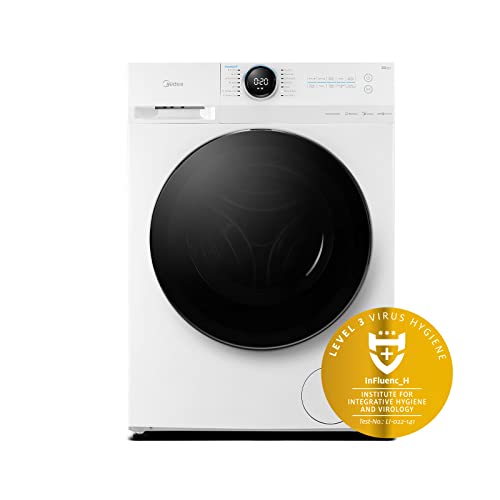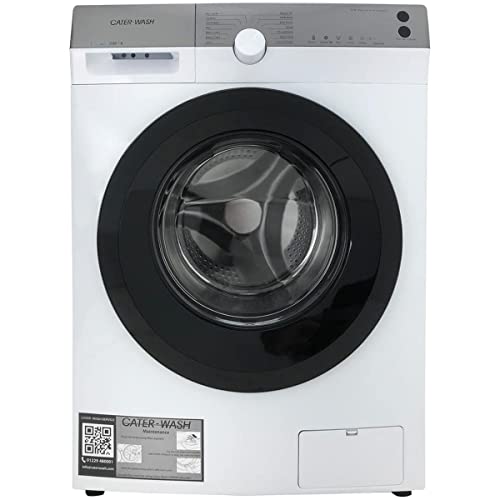What's The Job Market For 10kg Front Loader Professionals Like?
페이지 정보

본문
Why Buy a cheapest 10kg washing machine Front Loader?
The 10kg washers front loader is ideal for large loads of laundry, with plenty of space for big wash cycles and 13 wash programs that include handwash. It's a smart machine with advanced features.
Front loaders are generally slower to clean they are not offered with larger capacities, and are susceptible to mildew or mould. They are more energy- and water efficient than top-loaders.
Energy
The primary energy cost in a 10kg front loader is electricity to heat water to operating temperature, and also to run the motor. These costs can be offset with less energy usage in operation when compared with top-loaders, notably less power during the agitation cycle and during spin, and less water. Certain machines come with low-water cycles that use less water than the cotton cycle. This saves both water and energy.
In general, front-loading washers consume less soap than top-loaders. The drum's tumbling action also reduces foamy suds and decreases overflows, without affecting the cleaning. The door seals and the bellows of top-loaders can be more prone to wear. In addition, the top-loader's agitator's mechanical mechanism can cause significant wear and abrasion to clothing fabrics, as it forces clothes against each with paddles that are constantly dropping and dragging them through the wash. The amount of abrasion is measured by the amount of fabric accumulating in a dryer's lint filters, as the majority of lint is fragments of fibers that are ripped from clothing during washing and drying. To lessen this, many top-loaders are constructed to operate at a slower speed and may also have a "freshening" cycle to clean the bellows and mechanical gears.
Water
Top-load washers need an impeller or agitator to force water and detergent through clothing, causing mechanical wear and abrasion. By contrast, front-loaders use paddles that gently lift and lower clothing into a rotating drum for cleaning, reducing such wear. The amount of lint that is in the dryer lint filters can be used to determine the wear rate. Lint is mostly made of threads that are removed from clothing when drying and washing.
Because front-load machines require a lower level of water than top-loaders and are therefore less susceptible to leakage. Front-loaders require a bellows, or seal to prevent water from spraying through the door. These systems do not need to maintained as often as top-loaders.
 Front-loaders are less energy-intensive than top-loaders because they can use hot or cold water and some do so without a heating source. This efficiency can reduce the cost of operating the same laundry load, especially in areas where water, detergent, and energy are expensive.
Front-loaders are less energy-intensive than top-loaders because they can use hot or cold water and some do so without a heating source. This efficiency can reduce the cost of operating the same laundry load, especially in areas where water, detergent, and energy are expensive.
The 10kg washers front loader is ideal for large loads of laundry, with plenty of space for big wash cycles and 13 wash programs that include handwash. It's a smart machine with advanced features.
Front loaders are generally slower to clean they are not offered with larger capacities, and are susceptible to mildew or mould. They are more energy- and water efficient than top-loaders.
Energy
The primary energy cost in a 10kg front loader is electricity to heat water to operating temperature, and also to run the motor. These costs can be offset with less energy usage in operation when compared with top-loaders, notably less power during the agitation cycle and during spin, and less water. Certain machines come with low-water cycles that use less water than the cotton cycle. This saves both water and energy.
In general, front-loading washers consume less soap than top-loaders. The drum's tumbling action also reduces foamy suds and decreases overflows, without affecting the cleaning. The door seals and the bellows of top-loaders can be more prone to wear. In addition, the top-loader's agitator's mechanical mechanism can cause significant wear and abrasion to clothing fabrics, as it forces clothes against each with paddles that are constantly dropping and dragging them through the wash. The amount of abrasion is measured by the amount of fabric accumulating in a dryer's lint filters, as the majority of lint is fragments of fibers that are ripped from clothing during washing and drying. To lessen this, many top-loaders are constructed to operate at a slower speed and may also have a "freshening" cycle to clean the bellows and mechanical gears.
Water
Top-load washers need an impeller or agitator to force water and detergent through clothing, causing mechanical wear and abrasion. By contrast, front-loaders use paddles that gently lift and lower clothing into a rotating drum for cleaning, reducing such wear. The amount of lint that is in the dryer lint filters can be used to determine the wear rate. Lint is mostly made of threads that are removed from clothing when drying and washing.
Because front-load machines require a lower level of water than top-loaders and are therefore less susceptible to leakage. Front-loaders require a bellows, or seal to prevent water from spraying through the door. These systems do not need to maintained as often as top-loaders.
 Front-loaders are less energy-intensive than top-loaders because they can use hot or cold water and some do so without a heating source. This efficiency can reduce the cost of operating the same laundry load, especially in areas where water, detergent, and energy are expensive.
Front-loaders are less energy-intensive than top-loaders because they can use hot or cold water and some do so without a heating source. This efficiency can reduce the cost of operating the same laundry load, especially in areas where water, detergent, and energy are expensive.
- 이전글цыганское гадание на будущее бесплатно 24.06.07
- 다음글publicidad facebook andorra 24.06.07
댓글목록
등록된 댓글이 없습니다.